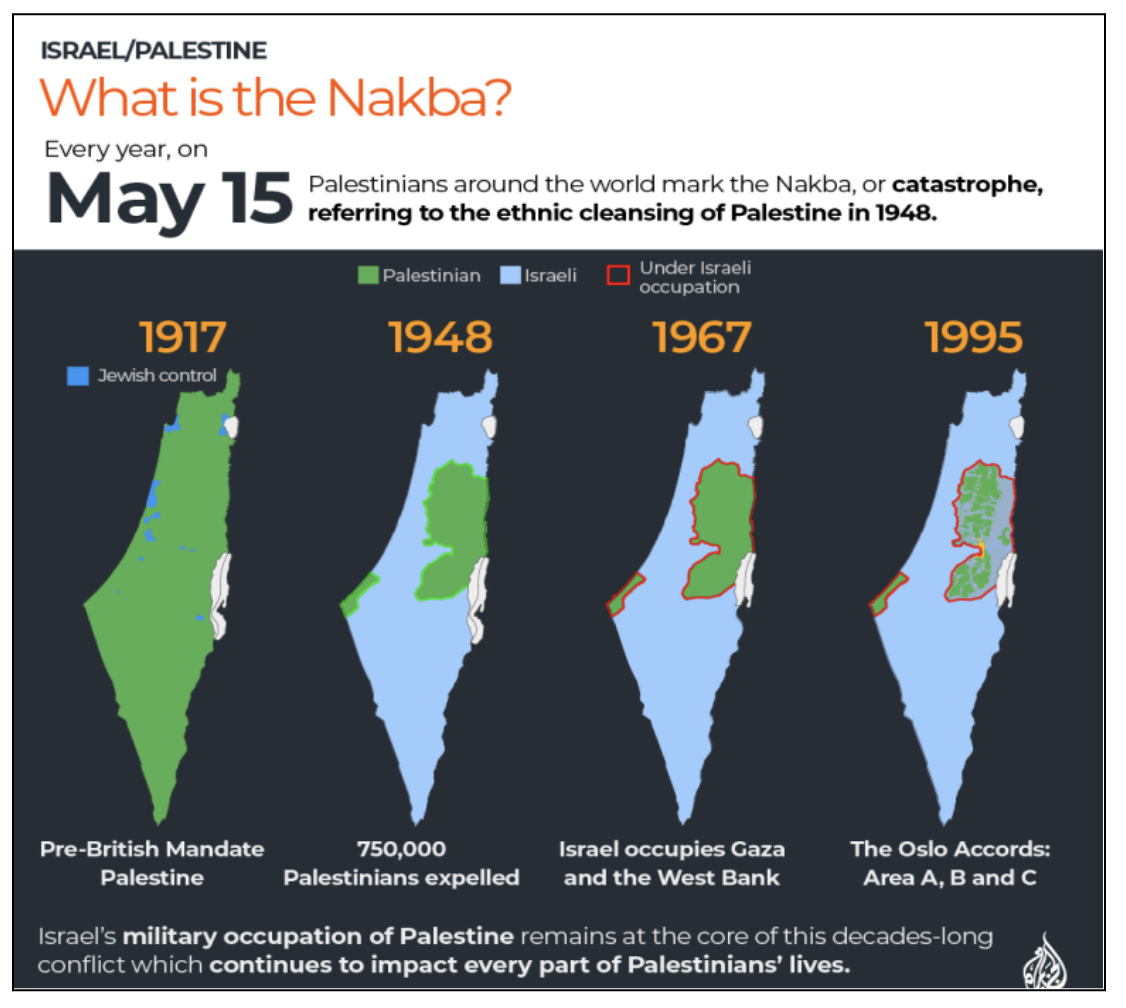News Excerpt:
Nakba, literally means “catastrophe” in Arabic, and refers to the forced displacement of Palestinians to facilitate the creation of Israel.

About Nakba Day:
- On May 15, every year, Palestinians mark the Nakba (“catastrophe” in Arabic), referring to the displacement of thousands of Palestinians, and the near-total destruction of Palestinian society in service of the creation of Israel.
- Nakba Day is observed on the day after Israel declared its independence on May 14, 1948.
- But the dispossession and displacement of Palestinian people neither began nor ended in 1948.
Promised’ land
- According to the Hebrew Bible, God “gave” the land of Canaan (corresponding to modern-day Israel-Palestine) to the descendants of Abraham.
- By the 19th century CE, however, Jewish people were a small minority in Palestine, which was then a province in the Ottoman Sultanate.
- Since antiquity, this land had passed among many ruling dispensations (from Greeks and Romans, to Persians and finally, the Ottomans, to name just a few).
Genesis of Zionism:
- In the late 19th century, there was a wave of anti-Jewish violence in Europe.
- Zionism, or the political movement towards the establishment of a Jewish homeland, was born out of this persecution.
- Theodor Herzl, remembered as the “spiritual father” of Israel, published a highly influential pamphlet called Der Judenstaat (The Jewish State) in 1896.
- The very first wave of Jewish migration to Palestine began in 1881, following the pogroms in Russia.
- Well-off Jewish people from eastern Europe began to buy large tracts of land in Palestine, from the now enfeebled Ottomans.
- They bribed local Ottoman officials, and paid large sums of money to absentee landlords to purchase land which had been tilled by Arabs for generations beginning the dispossession and displacement of Palestinians which continues till date.
Balfour Declaration and after
- Jewish migration into Palestine picked up in the 20th century, especially after the Balfour Declaration of 1917,
- In which the British promised to help the “establishment in Palestine of a national home for the Jewish people.
- With the collapse of the Ottoman Empire in 1914,
- Palestine had come under the jurisdiction of imperial Great Britain.
- By giving its support to Zionist goals in Palestine, the British hoped to shore up Jewish support for its war effort.
- Post-War, Britain began to actively enable Jewish migration into Mandatory Palestine, and soon effected significant demographic changes in the region.
- A 1920 British survey estimated Palestine's population at around 700,000, with Muslims comprising four-fifths and Jews numbering 76,000 in 64 settlements.
- By 1945, the population exceeded 1.76 million, with Muslims at 60% and Jews over 31%.
- The changing demographics fuelled ethnic conflict. Arab frustration soon manifested in the form of attacks on Jewish settlements,
- In response, Jewish migrants organized to form armed militias to protect settlers, and further usurp Palestinian land.
- In 1936, Palestinian Arabs launched a massive uprising against the British and Zionist settler-colonialists, known as the Arab Revolt.
- This lasted till 1939, and was eventually violently crushed by the British authorities.
The catastrophe
- Post-World War II, Britain decided to make an exit from Palestine and leave its fate up to the United Nations.
- On November 29, 1947, the UN adopted Resolution 181, recommending the partition of Palestine into Jewish and Arab states.
- The Jewish nation was allocated 55% of the land, big cities like :
- Jaffa with Arab majorities, key agricultural tracts, and important seaports Palestinian Arabs summarily rejected this proposal.
- Fighting broke out during the First Arab-Israeli War.
- Zionist militias, by this time, were far superior fighting forces than their Arab opponents,
- They benefited from the training many had received during the War, and received modern weaponry and funding from the West, especially the United States.
- These militias forced the mass expulsion of Palestinians from their towns and villages in what Palestinians remember as the Nakba.
- Since 1948, the Nakba has gone on to become a central aspect of Palestinian identity, with a significant population of Palestinians living as refugees in the Middle East, and across the world.


